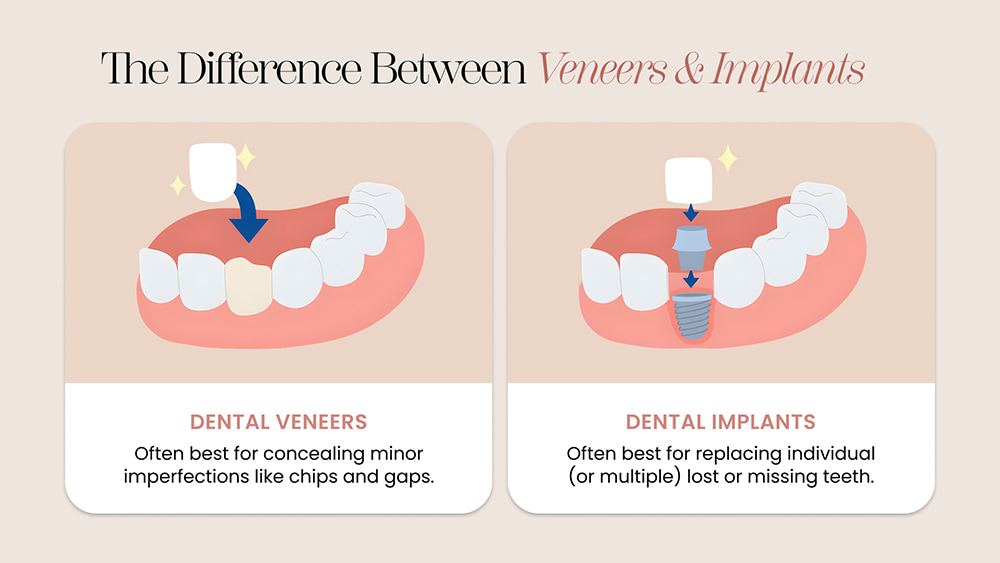
Dental implants or veneers? If you're struggling to decide, you're not alone. Learning the difference between these treatments will help you understand your options for restoring a strong, healthy smile. Dental implants offer a lasting solution for replacing a missing tooth (or teeth), while veneers are designed to correct imperfections like chips or stains on your existing teeth. This article will break down the pros, cons, costs, and recovery time for both options to help you make the best decision for your smile.
Key Takeaways
Dental implants offer a permanent solution for replacing missing teeth, while veneers enhance the appearance of existing teeth.
Implants are more expensive and time-consuming but offer long-term durability, while veneers are quicker to apply but may need replacement every 10-15 years.
Consulting a dentist is key to understanding which treatment fits your dental needs and goals best.
Understanding Dental Implants and Veneers
Dental implants and veneers both serve to enhance dental health and elevate the aesthetics of your smile, addressing issues from discoloration or damaged teeth to filling in gaps left by missing ones. To choose between them, it is essential to recognize their distinct functions and uses. Implants are designed to permanently replace missing teeth. A titanium post is introduced into the jawbone and acts as an artificial tooth root, which secures an abutment and porcelain crown. Dental implants offer the most durable replacement method for lost teeth, replicating the look and function of your natural teeth. Veneers, on the other hand, are slender facades made either from porcelain or composite resin material. Veneers are affixed to the front side of existing teeth for cosmetic enhancement, helping conceal flaws such as cracks, stains, or spacing irregularities between the teeth.
What Are Dental Implants?
Dental implants offer a durable and long-lasting solution for filling the gaps left by missing teeth. These artificial tooth replacements replicate the look, feel, and function of your natural teeth with remarkable precision.
The implant consists of three parts: a titanium post that integrates with your jawbone like an original tooth root, an abutment which connects the post to the replacement crown, and a porcelain crown that recreates the appearance and function of a real tooth.
The dental implant procedure involves a series of steps that take place over several months. An initial consultation and exam helps your dentist determine if dental implants are a good fit for you. If you are a good candidate for implants, the next step is dental implant surgery, where the titanium post is placed into your jawbone.
Once the titanium post is in place, there will be a healing period, which can take several months. This time allows for osseointegration, where the bone grows around the implant and holds it in place, just like the roots of your natural teeth. Once the posts are securely integrated into the jawbone, your dentist will attach the custom-made porcelain crown, completing the process to provide a durable, natural-looking replacement for the missing tooth.
Benefits of Dental Implants
Dental implants are a popular choice for restoration after tooth loss and come with several benefits. They look and feel just like your natural teeth, so you can eat, talk, and smile with confidence. And, with proper care, they can last a lifetime. They can also enhance your oral health by helping to prevent jawbone loss, gum disease, and tooth decay.
Without stimulation from a tooth or implant, the jawbone atrophies over time. Acting as artificial roots within the mouth, dental implants stimulate bone growth, preserving facial structure and maintaining robust dental health.
Drawbacks of Dental Implants
The dental implant procedure requires an investment of both time and money. Undergoing this dental treatment means committing to a surgical process that is not without risks such as infection or the possibility of nerve damage. The implant placement process requires multiple visits over several months, making it a lengthy and time-intensive treatment option.
Dental implants are also among the pricier treatments in dentistry. Costs can vary between $3,000 and $4,500 for each implant and may be higher if additional procedures like bone grafting or tooth extractions are needed to prepare the treatment area. Patients choosing to undergo implant surgery should be aware of the time and costs involved.
What Are Dental Veneers?
Dental veneers offer a sophisticated solution for those seeking to improve the look of their natural teeth. Crafted from materials like porcelain or composite resin, these slender casings are securely adhered to the tooth’s front surface. The use of dental veneers effectively conceals flaws such as stains, chips, spacing issues, and other types of minor damage.
The process of having dental veneers placed is less invasive than dental implants. In the first step, your dentist will shave off a small portion of the enamel to ensure better adhesion of the veneer to the natural tooth. They will then make precise impressions of your teeth for the creation of your veneers. Once the veneers are fabricated, the dentist attaches them directly onto your teeth. Often performed in just two dentist visits, this method offers an efficient route to a pristine-looking set of teeth.
Benefits of Dental Veneers
Dental veneers are a popular option within the field of cosmetic dentistry that come with many advantages. They address various aesthetic concerns such as spacing, irregular shaping, and stains on teeth, greatly improving your smile’s appeal. The process for attaching veneers is quick and minimally invasive, typically requiring only two appointments to complete and offering a quick way to transform the look of your smile.
Beyond their cosmetic benefits, veneers can also enhance self confidence. A beautiful smile can make a world of difference in how you feel about yourself and how others see you. Veneers give you the chance to get that picture-perfect smile you've always dreamed of, and the results look so natural that no one will know they're not your real teeth.
Drawbacks of Dental Veneers
Dental veneers provide significant improvements in appearance, but also come with certain limitations. They are prone to damage like chips, breaks, and staining after prolonged use. The typical lifespan of veneers ranges from ten to fifteen years, so they may need to be replaced eventually.
It’s also important to understand that veneer application requires a permanent alteration in the structure of the treated teeth. Enamel removal is an irreversible process. Once you opt for veneers, there’s no going back. This commitment demands careful consideration and discussion with your dentist to determine whether dental veneers align with your personal needs and expectations.





